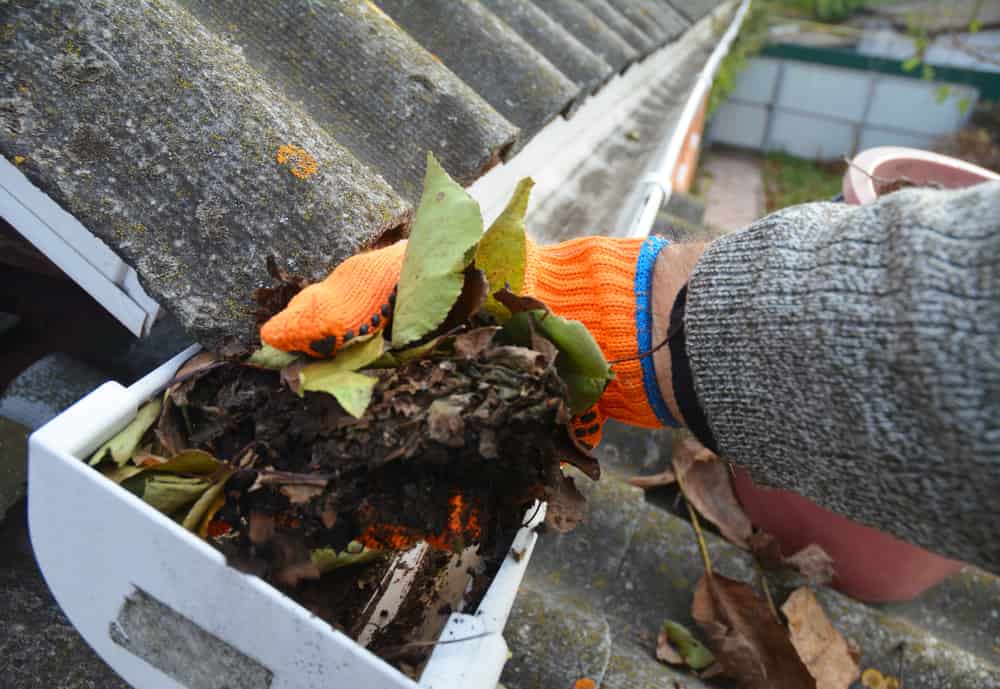
A diligent homeowner is seen clearing out leaves and debris, showcasing the importance of hands-on gutter maintenance.
©Radovan1/Shutterstock.com
If you’re like many homeowners, you’ve probably found yourself gazing up at your gutters, realizing it’s high time they got a good cleaning. But before you dive right in with the first method that comes to mind, let’s pause for a moment.
While there are many effective ways to clean gutters, there are also some methods that might do more harm than good. In this blog, we’ll discuss the approaches you should avoid when it comes to gutter maintenance. Your gutters—and your peace of mind—will be better for it.
So, grab your favorite beverage, get comfortable, and let’s navigate the world of gutter cleaning together.
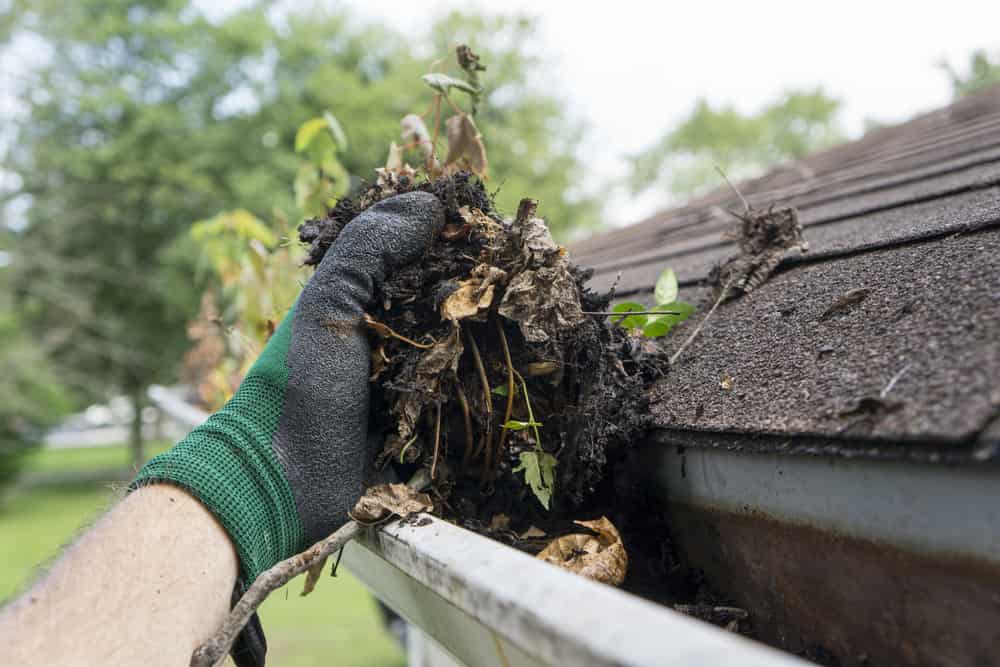
This close-up of a clogged gutter filled with leaves underscores the necessity of seasonal cleaning.
©Indy Edge/Shutterstock.com
Why Gutter Cleaning is Important
Before we delve into the nitty-gritty of gutter cleaning, it’s essential to grasp the significance of this often-overlooked task. Why do we roll up our sleeves and ensure our gutters are pristine?
Let’s break it down.
Preventing Water Damage
Think of gutters as the circulatory system of your home. Much like veins and arteries transport blood throughout our bodies, gutters channel rainwater away from your house. Their primary role is to direct water from your roof and ensure it flows away from your home’s foundation. When these gutters become clogged with leaves, twigs, and other debris, they can’t perform their job effectively.
The result?
Water begins to pool, overflow, and eventually seep into your home. This unwanted moisture can lead to a host of problems, including mold growth, wood rot, and even structural damage. In essence, well-maintained gutters act as the first line of defense, or the bodyguards, if you will, protecting your home from potential water-related catastrophes.
Avoiding Pest Infestations
Beyond the structural concerns, there’s another reason to keep those gutters clean: pests. Stagnant water is a magnet for a variety of unwelcome guests. Mosquitoes, for instance, thrive and breed in still water. A clogged gutter can quickly become a mosquito nursery, increasing the risk of bites and related diseases for your family.
But it’s not just about the bugs. Rodents, birds, and other critters find clogged gutters an attractive nesting site. The last thing you want is a family of rodents setting up shop right above your front door. So, by ensuring your gutters are clean, you’re also taking a proactive step in pest prevention.
Protecting Landscaping and Gardens
Your beautiful flowerbeds, shrubs, and even that vegetable garden you’ve been tending to can be adversely affected by clogged gutters. Overflowing water can lead to soil erosion, potentially washing away your plants or drowning their roots in excessive moisture. By ensuring your gutters channel water away as designed, you’re also safeguarding the time, effort, and money you’ve invested in your home’s green spaces.
Preserving Your Home’s Aesthetics
Water stains on your siding, sagging areas along the gutters, and visible overflow aren’t just functional issues; they’re cosmetic blemishes too. Regular cleaning helps maintain the aesthetic appeal of your home, ensuring it looks its best year-round. After all, first impressions matter, and your home’s exterior plays a significant role in that.
Increasing Gutter Lifespan
Regular maintenance goes a long way in prolonging the life of any product, and gutters are no exception. By routinely cleaning them and ensuring they’re free from debris, you’re preventing rusting, corrosion, and wear and tear. This not only saves you money in the long run but also reduces the hassle of frequent replacements or repairs.
Avoiding Basement Flooding
A direct consequence of clogged gutters is the risk of basement flooding. When water overflows and pools around your home’s foundation, it can find its way into your basement. This can damage stored items, weaken the foundation, and create a damp environment conducive to mold growth.
Promoting a Healthy Living Environment
Stagnant water and the mold growth it can induce aren’t just structural concerns. They can also impact the health of your home’s inhabitants. Mold spores can exacerbate allergies and respiratory issues, making regular gutter cleaning an essential step in maintaining a healthy living environment.
In essence, gutter cleaning is more than a mere maintenance task. It’s a comprehensive approach to home care, ensuring everything from the foundation to the roof remains in optimal condition. So, the next time you glance up and see those gutters, remember the myriad of reasons they deserve your attention and care.
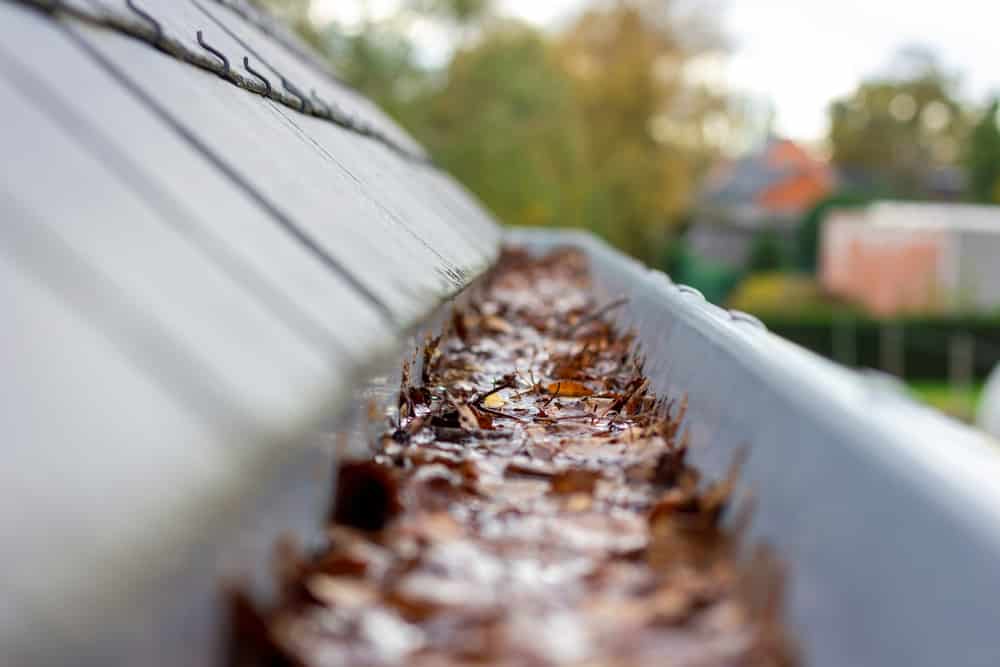
The image zooms in on an untreated gutter, emphasizing the consequences of neglect.
©Joeri Mostmans/Shutterstock.com
Dangerous Gutter Cleaning Methods to Avoid
With a clear understanding of the importance of clean gutters, it’s time to address the cleaning process itself. However, not all methods are safe or effective. Here are some approaches you should avoid:
Using Fire or Heat
It might sound outlandish, but believe it or not, some individuals have considered using fire or extreme heat to clear out gutter debris. This method is fraught with danger. Not only do you risk damaging the material of your gutters, but there’s also the very real threat of igniting a house fire. It’s a method that’s more destructive than constructive.
Harsh Chemicals
In the quest for a quick fix, you might be tempted to pour aggressive chemicals into the gutters to break down the blockages. However, this approach is detrimental on multiple fronts. Firstly, these chemicals can eat away at the material of the gutters, reducing their lifespan. Secondly, as these chemicals wash away, they can harm plants, contaminate groundwater, and pose a threat to local wildlife. It’s an environmentally unfriendly approach that can have lasting repercussions.
DIY Pressure Washing
Ah, the allure of pressure washers! At first glance, they seem like the superheroes of cleaning tools, promising to blast away even the most stubborn of gutter clogs. But, much like a superhero movie, there’s always a twist.
The Risk of High Pressure
When wielded by someone not fully acquainted with its power, a pressure washer can quickly turn from a helpful tool into a destructive force. The intense pressure, while great for cleaning driveways or decks, can be too much for your gutters. It can strip away the essential protective coatings that shield your gutters from rust and wear.
And that’s not all.
Instead of clearing out the debris, the high force can sometimes push it further down into the downspouts, making the original problem even worse. It’s like trying to unclog a sink with a firehose – overkill and counterproductive.
Using Improvised Tools
While innovation is often applauded, when it comes to gutter cleaning, sticking to tried-and-true methods is best. Some homeowners, in a bid to be resourceful, might use tools not designed for the task, like modified garden tools or even makeshift hooks. These can scratch the interior of the gutters, remove protective coatings, or even create punctures. It’s always best to use tools specifically designed for gutter cleaning to avoid unintentional damage.
Relying Solely on Robotic Cleaners
The age of technology has brought us robotic gutter cleaners, which, on paper, sound like a dream come true. However, while they can be effective for light cleaning or maintenance, they often lack the thoroughness required for a deep clean. Relying solely on them can lead to overlooked blockages or areas of concern.
Using Boiling Water
Another method some might consider is pouring boiling water into the gutters to break down tough blockages, especially during colder months to melt ice. While it might seem effective, the sudden temperature change can damage your gutters, leading to cracks or warping. It’s best to avoid extreme temperature changes and stick to safer methods.
In the realm of home maintenance, it’s always tempting to look for shortcuts or innovative solutions. However, with something as crucial as gutter cleaning, it’s essential to prioritize safety and effectiveness over convenience. Remember, the goal is not just a clean gutter, but a home protected from potential water damage.
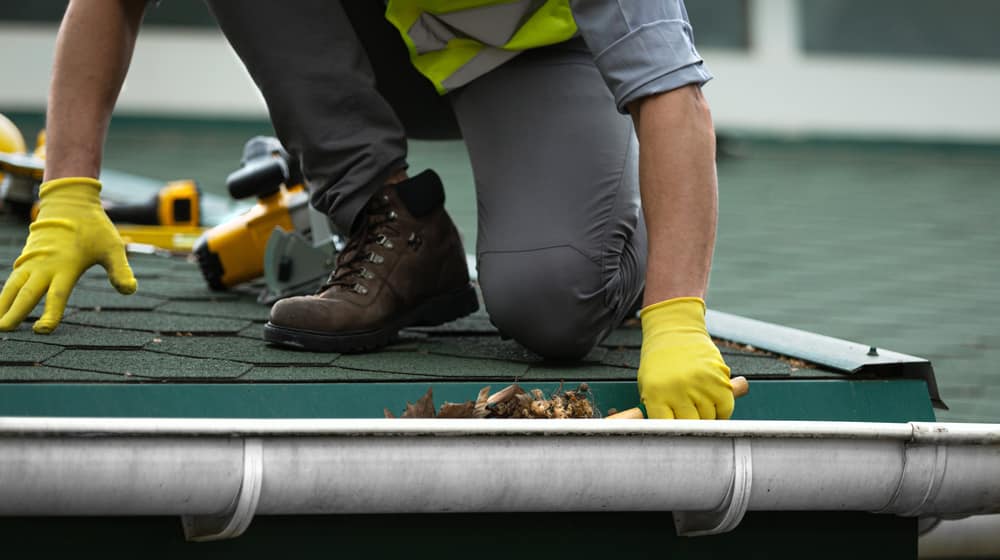
In this image, a professional gutter cleaning service uses specialized tools, to ensure the gutters are thoroughly cleaned.
©Billion Photos/Shutterstock.com
The Domino Effect: When Gutter Damage Impacts Your Entire Home
Gutters, those unassuming channels that line the edges of our roofs, play a pivotal role in the overall health of our homes. Often, homeowners underestimate the potential consequences of gutter damage, viewing it as a minor inconvenience. However, the reality is that these small structures serve as the first line of defense against a cascade of potential home issues.
When gutters are damaged, whether through neglect, improper cleaning techniques, or the use of unsuitable tools, they can’t effectively direct water away from your home. This seemingly simple malfunction can set off a chain reaction of problems.
Foundation Woes
Water that spills over from malfunctioning gutters can pool around the foundation of your home. Over time, this accumulated moisture can weaken the foundation, leading to cracks, shifts, and even structural instability. Repairing foundation damage is not only costly but also complex, often requiring the expertise of professionals and sometimes even temporary relocation.
Landscaping Troubles
That beautiful garden or the meticulously maintained lawn can suffer too. Excess water runoff can erode the soil, drown plants, and create unsightly and potentially hazardous muddy patches. Your hard work in landscaping can be undone in a short time if gutters aren’t functioning correctly.
Wall and Ceiling Damage
Water has a sneaky way of finding its path into the smallest of crevices. When gutters fail, water can seep into the walls and ceilings of your home. This can lead to unsightly water stains, peeling paint, and, worse, mold growth. Mold not only damages the structure of your home but can also pose serious health risks to its inhabitants.
Basement Flooding
A basement flood is every homeowner’s nightmare. Damaged gutters increase this risk exponentially. Water pooling around the foundation can find its way into the basement, leading to flooding, damage to items stored there, and a perfect environment for mold and mildew.
Increased Repair Costs
While fixing a damaged gutter might seem like a minor expense, the costs associated with the aftermath of a malfunctioning gutter system can be staggering. From foundation repairs to mold remediation, the financial implications can be a heavy burden.
In essence, while gutters might seem like just another part of your home’s exterior, their health directly impacts the well-being of your entire home. It’s always wise to give them the attention and care they deserve, ensuring they function optimally and protect your home from the myriad of potential issues that arise from water damage. After all, prevention is not only better but often cheaper than the cure.
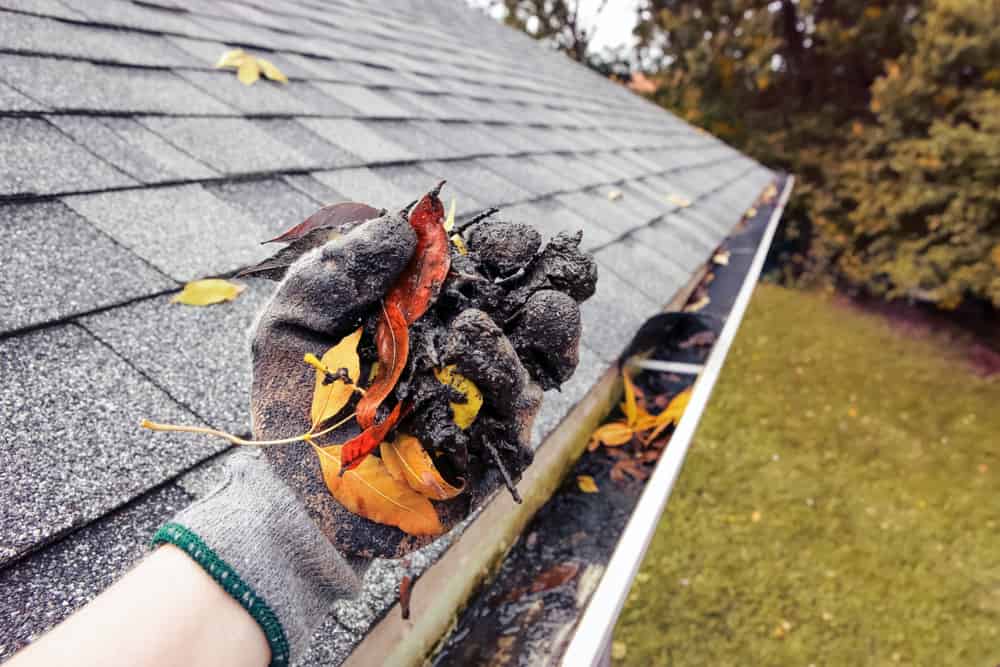
A homeowner, equipped with gloves, meticulously works to free the gutter from stubborn blockages, emphasizing the value of regular upkeep.
©Suzanne Tucker/Shutterstock.com
Common Misconceptions About Gutter Cleaning
Ah, the world of gutter cleaning! Like many home maintenance tasks, it’s riddled with myths and misconceptions. Let’s dive into some of the most common ones and set the record straight.
Using a Leaf Blower
At first glance, using a leaf blower might seem like a genius idea. After all, if it can clear your yard of leaves, why not the gutters? Here’s the catch: while leaf blowers are great for open spaces, they’re not designed for the confined structure of gutters. Instead of effectively removing debris, they often push it further into the downspouts, creating even more substantial blockages. And let’s not even get started on the safety aspect. Trying to balance on a ladder with a leaf blower in hand? It’s a recipe for disaster.
Climbing Without Proper Equipment
Ladders and heights are no joke. Every year, countless homeowners suffer injuries from falls, many due to inadequate or faulty equipment. If you’re venturing up to clean those gutters, ensure your ladder is sturdy, the right height, and placed on even ground. And never, ever reach out too far. Overextending can cause the ladder to tip. Safety first, always!
Thinking Rain Will Wash Debris Away
Some folks believe that a good downpour is all it takes to clear out gutters. While rain can wash away some loose debris, it’s not a replacement for a thorough cleaning. Heavy rain can exacerbate clogs, leading to overflows and potential water damage.
Assuming All Gutters Are the Same
Not all gutters are created equal. Some homes have traditional open gutters, while others might have gutter guards or covers. Each type requires a different cleaning approach. Assuming a one-size-fits-all method can lead to ineffective cleaning or even damage.
Believing Gutters Only Need Cleaning in the Fall
While autumn, with its falling leaves, is a prime time for gutter clogs, it’s not the only season that can cause issues. Spring brings seed pods, blossoms, and other debris. Even in winter, snow and ice can accumulate, leading to ice dams. The takeaway? Regular checks and cleaning are essential year-round.
Thinking Birds and Pests Aren’t a Big Deal
Spotting a bird’s nest in your gutter might seem harmless, even quaint. But birds, along with pests like squirrels, rodents, or snakes in gutters can cause significant blockages. Plus, they might decide to make their way into your home, leading to a whole other set of problems.
In the world of gutter cleaning, knowledge is power. By understanding and debunking these misconceptions, you’re on your way to ensuring your gutters remain in tip-top shape, protecting your home for years to come.
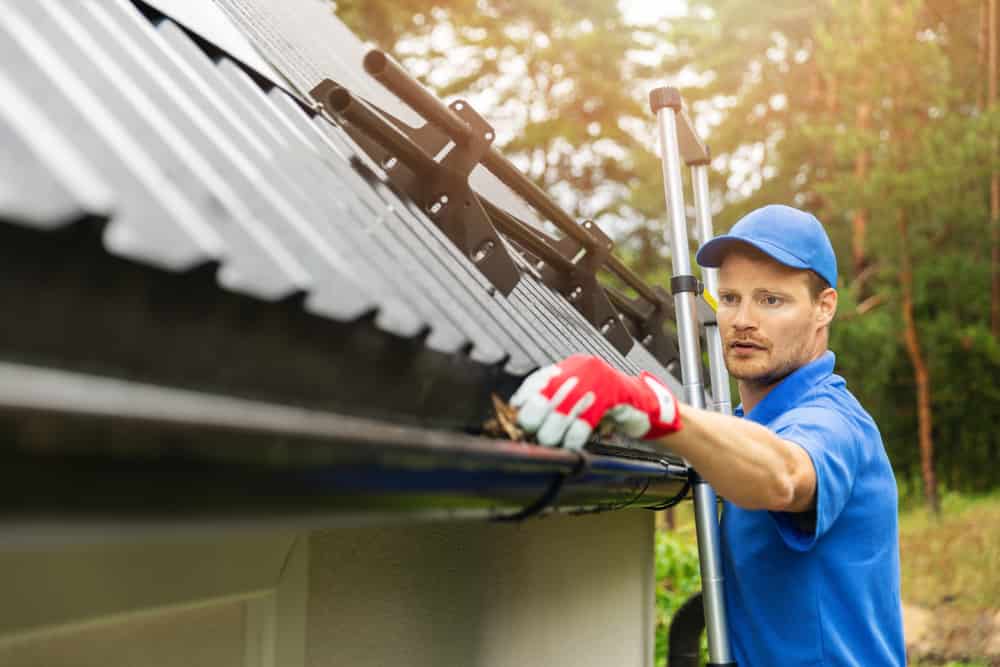
An expert is seen with tools during the cleaning process, highlighting the importance of preparation and the right equipment.
©ronstik/Shutterstock.com
Safe Alternatives for Gutter Cleaning
Alright, now that we’ve debunked some myths and highlighted what not to do, let’s shift our focus to the safer, more effective ways to keep those gutters clean and functional. After all, it’s not just about avoiding pitfalls; it’s about finding the best solutions for your home.
Gutter Guards
Think of gutter guards as the superheroes of the gutter world. These protective screens or meshes are designed to cover your gutters, allowing water to flow freely while keeping out leaves, twigs, and other debris. It’s like equipping your gutters with a protective shield, warding off potential clog-causing culprits. They come in various materials and designs, so you can choose one that best fits your home’s needs and aesthetics.
Hiring Professionals
Sometimes, the best approach is to leave it to the experts. Professional gutter cleaning services have the right tools, knowledge, and experience to tackle the task efficiently. They can spot potential issues that you might miss, such as small cracks or weak points in the gutter system. Plus, they’re trained to work at heights, ensuring the job gets done without any safety hazards.
Regular Maintenance Checks
An ounce of prevention is worth a pound of cure. By regularly inspecting your gutters – say, once every few months – you can spot and address minor issues before they escalate. Look out for areas where water isn’t draining properly, signs of rust, or any visible damage. This proactive approach can save you time and money in the long run.
Using Specialized Cleaning Tools
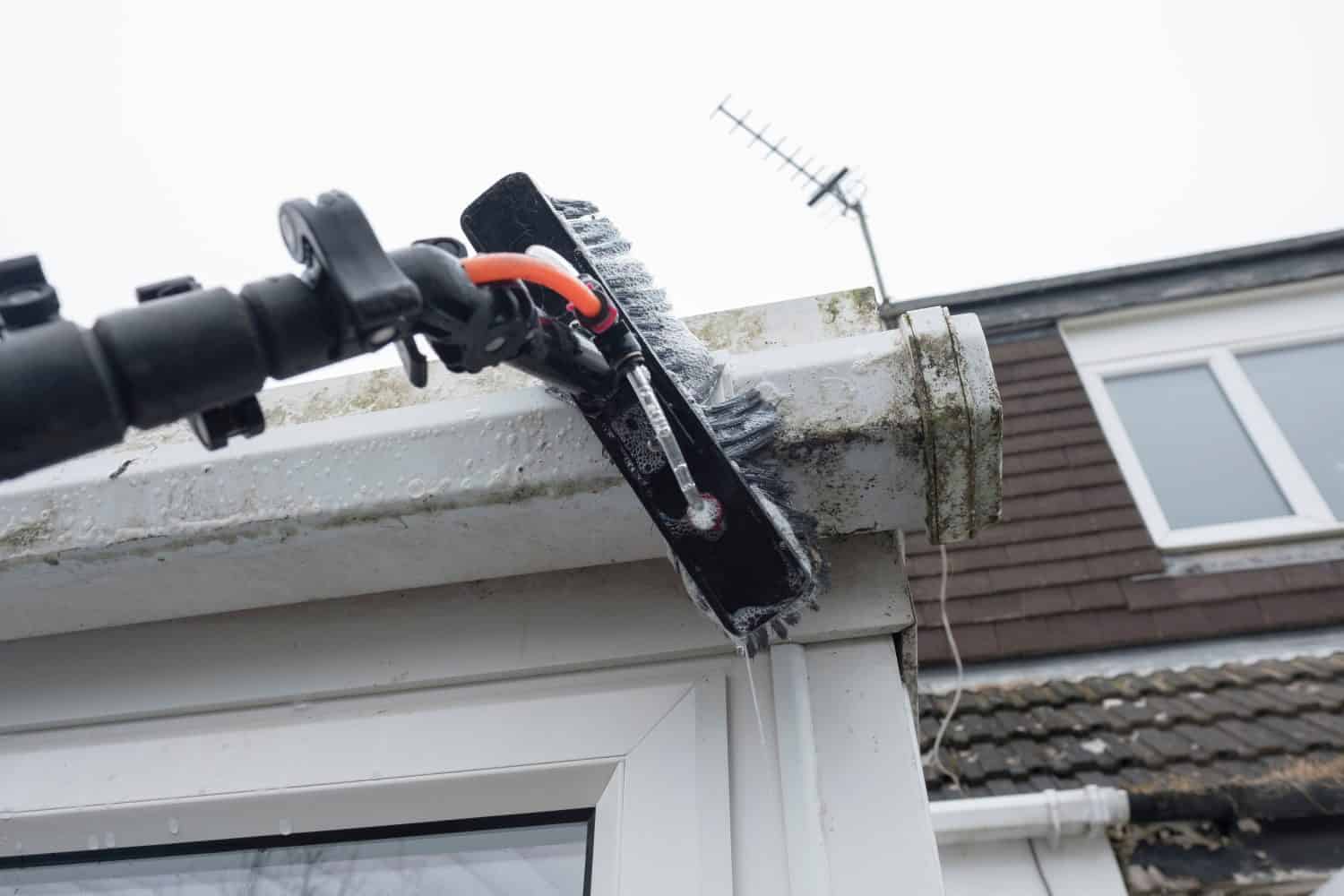
Specialized gutter cleaning tool.
©seeshooteatrepeat/Shutterstock.com
There are tools designed specifically for gutter cleaning, from claw-like scoops to hose attachments with specialized nozzles. These tools can make the cleaning process more efficient and reduce the need for constant ladder adjustments. They’re especially handy for those hard-to-reach spots.
Eco-friendly Cleaning Solutions
If you find that your gutters need a bit more than just a physical cleaning, consider using eco-friendly solutions. Mixtures like warm water with a bit of dish soap can help break down tougher grime without introducing harmful chemicals into your environment.
Installing Downspout Screens
While gutter guards protect the length of the gutter, downspout screens are designed to prevent debris from entering the downspouts. These are especially useful in areas where tree seeds, small twigs, or pine needles are common, as they can easily slip through gutter guards but cause significant clogs in downspouts.
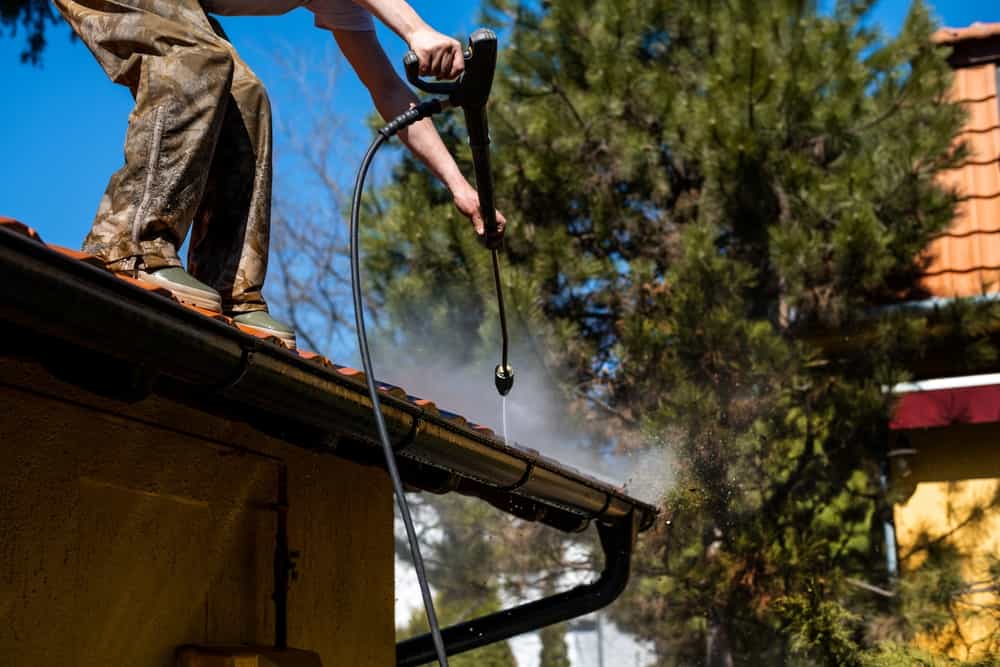
With tools in hand, a man meticulously cleans his gutters, ensuring no spot is overlooked.
©Branimir Todorovic/Shutterstock.com
Final Thoughts on Gutter Maintenance
As we wrap up our discussion on gutter cleaning, it’s clear that this seemingly mundane task holds significant importance in home maintenance. While cleaning your gutters is undeniably essential, the approach you choose can make all the difference.
By sidestepping common misconceptions and pitfalls, and by embracing safe and effective methods, you ensure not only the smooth flow of water but also the longevity of your gutters.
But always bear in mind: it’s not merely about removing debris; it’s about safeguarding your home against potential damages.
So, the next time you look up at your gutters, remember the pivotal role they play and give them the care they rightfully deserve.
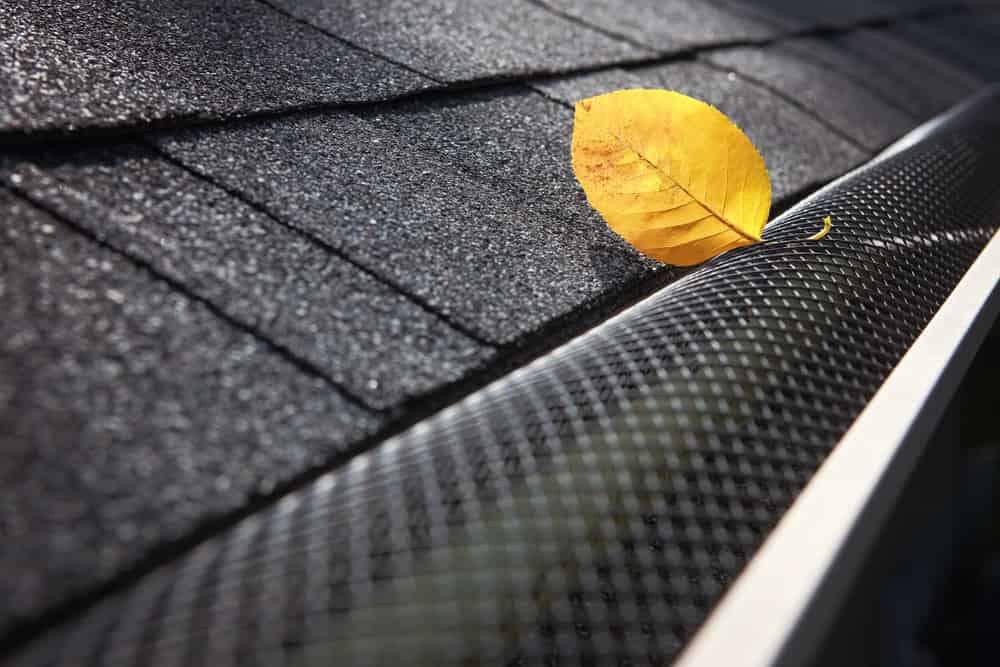
This image captures the serene beauty of a well-maintained gutter system in action.
©Suzanne Tucker/Shutterstock.com
Your Gutter Cleaning Queries Answered
Gutters, while often overlooked, play a pivotal role in protecting our homes. As with any essential home maintenance task, questions arise about the best practices, tools, and techniques. Whether you’re a seasoned homeowner or new to the world of gutter upkeep, you might find yourself pondering some common queries.
To help you out, we’ve compiled and answered some frequently asked questions about gutter cleaning. Let’s dive in!
1. Can I use vinegar or baking soda to clean my gutters?
Vinegar and baking soda are popular household cleaning agents, known for their natural and non-toxic properties. While they’re gentler than many commercial chemicals, when it comes to gutters, the old-school method of plain water and a dedicated gutter brush tends to be the most effective. This approach ensures thorough cleaning without the risk of unwanted chemical reactions.
2. How often should I clean my gutters?
A general rule of thumb is to give your gutters a good cleaning at least twice a year: once in the spring to clear out any debris accumulated over winter, and once in the fall after the leaves have dropped. However, if your home is surrounded by many trees, especially those that shed leaves, seeds, or needles frequently, you might find yourself needing to clean them more often to prevent blockages.
3. Are gutter guards worth the investment?
Gutter guards can be a game-changer for many homeowners. They act as a barrier, preventing large debris from entering the gutters while allowing water to flow freely. This can significantly reduce the frequency of required cleanings. However, it’s essential to note that while they minimize debris accumulation, they don’t eliminate the need for cleaning entirely. Over time, smaller particles can still accumulate, so occasional maintenance is still a must.
4. Can I use a regular garden hose for gutter cleaning?
Absolutely! A garden hose can be a handy tool in your gutter-cleaning arsenal. However, to make the most of it, ensure you’re using a nozzle attachment that can provide a focused stream of water. This will help you dislodge and wash away debris more effectively. Remember, it’s all about getting into those nooks and crannies!
5. Is there a specific type of ladder I should use when cleaning gutters?
Safety first! When you’re working off the ground, it’s crucial to have a reliable ladder. Opt for a sturdy, extendable ladder that can reach your gutters comfortably without overstretching. Ensure it has non-slip feet to prevent any unwanted movement.
And here’s a pro tip: never rest the ladder directly against the gutter as this can cause damage. Instead, invest in ladder stabilizers or standoffs. These accessories ensure stability and prevent the ladder from damaging your gutters.
Remember, when it comes to home maintenance, being informed is half the battle. By knowing the best practices and what to avoid, you’re well on your way to ensuring the longevity and functionality of your gutters.
The photo featured at the top of this post is © Suzanne Tucker/Shutterstock.com
Thank you for reading! Have some feedback for us? Contact the AZ Animals editorial team.







